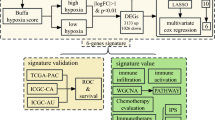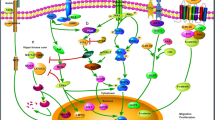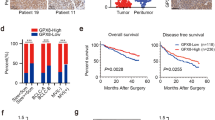Abstract
Metastasis/recurrence has been the most fundamental characteristic of hepatocellular cancer (HCC) and the ultimate cause of most HCC-related deaths. However, there are still a limited number of reliable tumor markers that can be used to predict the possibility of metastasis/recurrence in an HCC patient after operation. Recently, much evidence has shown that glypican-3 (GPC3) can be a useful tool to identify the early development of HCC, but little research has been done to test its usefulness as a prognostic marker related to post-operative metastasis/recurrence in HCC patients. In this study, the expression of GPC3 and its relationship with clinicopathological factors were determined by immunohistochemical analysis in 61 primary HCC patients. The potential prognostic value of GPC3 was investigated by comparing the survival time between HCC patients with high and low GPC3 expression. The results demonstrated that GPC3 expression was closely related with metastasis/recurrence in an HCC patient who can receive the operation. The risk of metastasis/recurrence after surgery in an HCC patient with high GPC3 expression was increased to 3.214 as compared to that of an HCC patient with low GPC3 expression. Survival analysis showed that HCC patients with high GPC3 expression had a significantly shorter overall survival time than HCC patients with low GPC3 expression (P = 0.003). Further, multivariate analysis showed that GPC3 expression was a significant, independent prognostic parameter (P = 0.030) for HCC patients. Overall, the study indicates that GPC3 might be a valuable marker closely related with prognosis and post-operative metastasis/recurrence in HCC patients.


Similar content being viewed by others
References
Mazzanti R, Gramantieri L, Bolondi L (2008) Hepatocellular carcinoma: epidemiology and clinical aspects. Mol Aspects Med 29:130–140
Thomas MB, Zhu AX (2005) Hepatocellular carcinoma: the need for progress. J Clin Oncol 23:2892–2899
Ng KK, Lo CM, Liu CL, Poon RT, Chan SC, Fan ST (2008) Survival analysis of patients with transplantable recurrent hepatocellular carcinoma: implications for salvage liver transplant. Arch Surg 143:68–74 discussion
Kim do Y, Paik YH, Ahn SH, Youn YJ, Choi JW, Kim JK, Lee KS, Chon CY, Han KH (2007) PIVKA-II is a useful tumor marker for recurrent hepatocellular carcinoma after surgical resection. Oncology 72:52–57
Filmus J (2002) The contribution of in vivo manipulation of gene expression to the understanding of the function of glypicans. Glycoconj J 19:319–323
Hsu HC, Cheng W, Lai PL (1997) Cloning and expression of a developmentally regulated transcript MXR7 in hepatocellular carcinoma: biological significance and temporospatial distribution. Cancer Res 57:5179–5184
Sung YK, Hwang SY, Park MK, Park MK, Farooq M, Han IS, Bae HI, Kim JC, Kim M (2003) Glypican-3 is overexpressed in human hepatocellular carcinoma. Cancer Sci 94:259–262
Nakatsura T, Yoshihiro Y, Senju S, Monji M, Komori H, Motomura Y, Hosaka S, Beppu T, Ishiko T, Kamohara H, Ashihara H, Katagiri T, Furukawa Y, Fujiyama S, Ogawa M, Nakamura Y, Nishimura Y (2003) Glypican-3, overexpressed specifically in human hepatocellular carcinoma, is a novel tumor marker. Biochem Biophys Res Commun 306:16–25
Capurro M, Wanless IR, Sherman M, Deboer G, Shi W, Miyoshi E, Filmus J (2003) Glypican-3: a novel serum and histochemical marker for hepatocellular carcinoma. Gastroenterology 125:89–97
Yi Ding, Bin Chen, Wang S, Zhao L, Chen J, Ding Y, Chen L, Luo R (2008) Overexpression of Tiam1 in hepatocellular carcinomas predicts poor prognosis of HCC patients. Int J Cancer 124:653–658
Debra LZ, Anita G, Chunyan L, Pauline MC, Guang-Yu Y, Ximing JY (2008) Expression of glypican3 in hepatoblastoma: an immunohistochemical study of 65 cases. Hum Pathol 39:224–230
Pilia G, Hughes-Benzie RM, MacKenzie A, Baybayan P, Chen EY, Huber R, Neri G, Cao A, Forabosco A, Schlessinger D (1996) Mutations in GPC3, a glypican gene, cause the Simpson–Golabi–Behmel overgrowth syndrome. Nat Genet 12:241–247
Cano-Gauci DF, Song HH, Yang H, McKerlie C, Choo B, Shi W, Pullano R, Piscione TD, Grisaru S, Soon S, Sedlackova L, Tanswell AK, Mak TW, Yeger H, Lockwood GA, Rosenblum ND, Filmus J (1999) Glypican-3 deficient mice exhibit developmental overgrowth and some of the abnormalities typical of Simpson–Golabi–Behmel syndrome. J Cell Biol 146:255–264
Alfonso DG, Mitsunori K, Wen S, Howard S, Joseph RT, Linda ZP, Jorge F (1998) OCI 5/GPC3, a glypican encoded by a gene that is mutated in the Simpson–Golabi–Behmel overgrowth syndrome, induces apoptosis in a cell-specific manner. J Cell Biol 141:1407–1414
Peters MG, Farias E, Colombo L, Filmus J, Puricelli L, Bal DK, Joffe E (2003) Inhibition of invasion and metastasis by glypican-3 in a syngeneic breast cancer model. Breast Cancer Res Treat 80:221–232
Filmus J, Capurro M, Rast J (2008) Glypicans. Genome Biol 9:224
Capurro MI, Xiang YY, Lobe C, Filmus J (2005) Glypican-3 promotes the growth of hepatocellular carcinoma by stimulating canonical Wnt signaling. Cancer Res 65:6245–6254
Song HH, Shi W, Xiang YY, Filmus J (2005) The loss of glypican-3 induces alterations in Wnt signaling. J Biol Chem 280:2116–2125
Stigliano I, Puricelli L, Filmus J, Sogayar MC, Bal E, Peters MG (2009) Glypican-3 regulates migration, adhesion and actin cytoskeleton organization in mammary tumor cells through Wnt signaling modulation. Breast Cancer Res Treat 114:251–262
Torisu Y, Watanabe A, Nonaka A, Midorikawa Y, Makuuchi M, Shimamura T, Sugimura H, Niida A, Akiyama T, Iwanari H, Kodama T, Zeniya M, Aburatani H (2008) Human homolog of NOTUM, overexpressed in hepatocellular carcinoma, is regulated transcriptionally by beta-catenin/TCF. Cancer Sci 99:1139–1146
Zhu Z-W, Friess H, Wang L, Abou-Shady M, Zimmermann A, Lander AD, Korc M, Kleeff J, Büchler MW (2001) Enhanced glypican-3 expression differentiates the majority of hepatocellular carcinomas from benign hepatic disorders. Gut 48(4):558–564
Shirakawa H, Suzuki H, Shimomura M, Kojima M, Gotohda N, Takahashi S, Nakagohri T, Konishi M, Kobayashi N, Kinoshita T, Nakatsura T (2009) Glypican-3 expression is correlated with poor prognosis in hepatocellular carcinoma. Cancer Sci 100(8):1403–1407
Kwack MH, Choi BY, Sung YK (2006) Cellular changes resulting from forced expression of glypican-3 in hepatocellular carcinoma cells. Histol Histopatho Mol Cells 21:224–228
Zhou L, Rui JA, Wang SB, Chen SG, Qu Q (2008) LCSGJ-T classification, 6th or 5th edition TNM staging did not independently predict the long-term prognosis of HBV-related hepatocellular carcinoma after radical hepatectomy. J Surg Res 34:1–7
Hippo Y, Watanabe K, Watanabe A, Midorikawa Y, Yamamoto S, Ihara S, Tokita S, Iwanari H, Ito Y, Nakano K, Nezu J, Tsunoda H, Yoshino T, Ohizumi I, Tsuchiya M, Ohnishi S, Makuuchi M, Hamakubo T, Kodama T, Aburatani H (2004) Identification of soluble NH2-terminal fragment of glypican-3 as a serological marker for early-stage of hepatocellular carcinoma. Cancer Res 64:2418–2423
Roberta WC, Joh JW, Johnson PJ, Monden M, Pawlik TM, Ronnie TPP (2007) Biology of hepatocellular carcinoma. Ann Surg Oncol 15:962–971
Nakano K, Orita T, Nezu J, Yoshino T, Ohizumi I, Sugimoto M, Furugaki K, Kinoshita Y, Ishiguro T, Hamakubo T, Kodama T, Aburatani H, Yamada-Okabe H, Tsuchiya M (2009) Anti-glypican3 antibodies cause ADCC against human hepatocellular carcinoma cells. Biochem Biophys Res Commun 378:279–284
Ishiguro T, Masamichi Sugimoto M, Kinoshita Y, Miyazaki Y, Nakano K, Tsunoda H, Sugo I, Ohizumi I, Aburatani H, Hamakubo Takao, Kodama T, Tsuchiya M, Yamada-Okabe H (2008) Anti-glypican3 antibody as a potential antitumor agent for human liver cancer. Cancer Res 68:9832–9838
Nakatsura T, Komori H, Kubo T, Yoshitake Y, Senju S, Katagiri T, Furukawa Y, Ogawa M, Nakamura Y, Nishimura Y (2004) Mouse homologue of a novel human oncofetal antigen, glypican-3, evokes T cell-mediated tumor rejection without autoimmune reactions in mice. Clin Cancer Res 10:8630–8640
Komori H, Nakatsura T, Senju S, Yoshitake Y, Motomura Y, Ikuta Y, Fukuma D, Yokomine K, Harao M, Beppu T, Matsui M, Torigoe T, Sato N, Baba H, Nishimura Y (2006) Identification of HLA-A2- or HLA-A24-restricted CTL epitopes possibly useful for glypican-3-specific immunotherapy of hepatocellular carcinoma. Clin Cancer Res 12:2689–2697
Acknowledgment
This work was grant sponsored by National Natural Science Foundation of China; Grant numbers: 30801380. Guangdong Provincal Science Foundation; Grant numbers: 10451001002005047, 8451051501001344.
Author information
Authors and Affiliations
Corresponding authors
Additional information
Su Ning and Chen Bin contributed equally to this work.
Rights and permissions
About this article
Cite this article
Ning, S., Bin, C., Na, H. et al. Glypican-3, a novel prognostic marker of hepatocellular cancer, is related with postoperative metastasis and recurrence in hepatocellular cancer patients. Mol Biol Rep 39, 351–357 (2012). https://doi.org/10.1007/s11033-011-0745-y
Received:
Accepted:
Published:
Issue Date:
DOI: https://doi.org/10.1007/s11033-011-0745-y




